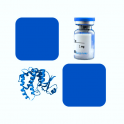
- Remove this product from my favorite's list.
- Add this product to my list of favorites.
Products
Viewed products
Newsletter
 |  |  |  |  |  |

Background
Leukemia inhibitory factor, or LIF, an interleukin 6 class cytokine, is a protein in cells that affects cell growth and development.Leukemia Inhibitory Factor has several functions such as cholinergic neuron differentiation, control of stem cell pluripotency, bone & fat metabolism, mitogenesis of factor dependent cell lines & promotion of megakaryocyte production in vivo. Removal of LIF pushes stem cells toward differentiation, but they retain their proliferative potential or pluripotency. Therefore LIF is used in mouse embryonic stem cell culture. It is necessary to maintain the stem cells in an undifferentiated state, however genetic manipulation of embryonic stem cells allows for LIF independent growth, notably overexpression of the gene Nanog. LIF is not required for culture of human embryonic stem cells.
Source
Recombinant Mouse LIF, His Tag (LIF-M5227) is expressed from human 293 cells (HEK293). It contains AA Ser 24 - Phe 203 (Accession # P09056-1).
Predicted N-terminus: Ser 24
Molecular Characterization
This protein carries a polyhistidine tag at the C-terminus.
The protein has a calculated MW of 20.8 kDa. The protein migrates as 33-45 kDa under reducing (R) condition (SDS-PAGE) due to glycosylation.
Endotoxin
Less than 1.0 EU per μg by the LAL method.
Purity
>90% as determined by SDS-PAGE.
>90% as determined by SEC-MALS.
Formulation
Lyophilized from 0.22 μm filtered solution in PBS, pH7.4. Normally trehalose is added as protectant before lyophilization.
Reconstitution
Please see Certificate of Analysis for specific instructions.
For best performance, we strongly recommend you to follow the reconstitution protocol provided in the CoA.
Storage
For long term storage, the product should be stored at lyophilized state at -20°C or lower.
Please avoid repeated freeze-thaw cycles.
This product is stable after storage at:
-20°C to -70°C for 12 months in lyophilized state;
-70°C for 3 months under sterile conditions after reconstitution.
(1) "Genetic knockout of porcine GGTA1 or CMAH/GGTA1 is associated with the emergence of neo-glycans"
Morticelli, Rossdam, Cajic et al
Xenotransplantation (2023)
(2) "GH20 and GH84 β-N-acetylglucosaminidases with different linkage specificities underpin mucin O-glycan breakdown capability of Bifidobacterium bifidum"
Takada, Katoh, Sakanaka et al
J Biol Chem (2023)
(3) "Establishment of bovine trophoblast stem cells"
Wang, Ming, Yu et al
Cell Rep (2023)
Showing 1-3 of 11654 papers.
Follow us